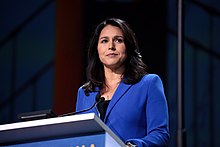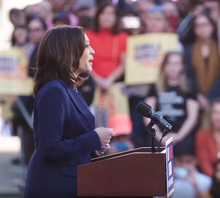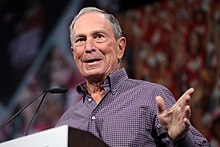2017
Rep.
John Delaney was the first major candidate to announce his campaign, two and a half years before the 2020 Iowa caucus.
Entrepreneur
Andrew Yang was the second major Democratic candidate to announce his campaign.
Rep.
Tulsi Gabbard became the first major female candidate to announce her candidacy on January 11, 2019.
Sen.
Bernie Sanders launched his second campaign on February 19, 2019.
Governor
Jay Inslee launched his presidential bid on March 1, 2019, becoming the first incumbent governor to do so.
In the weeks following the election of Donald Trump in the 2016 election, media speculation regarding potential candidates for the 2020 Democratic Party presidential primaries began to circulate. As the Senate began confirmation hearings for members of the cabinet, speculation centered on the prospects of the "hell-no caucus", six senators who went on to vote against the majority of Trump's nominees. According to Politico, the members of the "hell-no caucus" were Cory Booker, Kamala Harris, Kirsten Gillibrand, Bernie Sanders, Jeff Merkley, and Elizabeth Warren. [1] [2] Other speculation centered on then-Vice-President Joe Biden making a third presidential bid following failed attempts in 1988 and 2008. [3]
This page is based on this
Wikipedia article Text is available under the
CC BY-SA 4.0 license; additional terms may apply.
Images, videos and audio are available under their respective licenses.

























